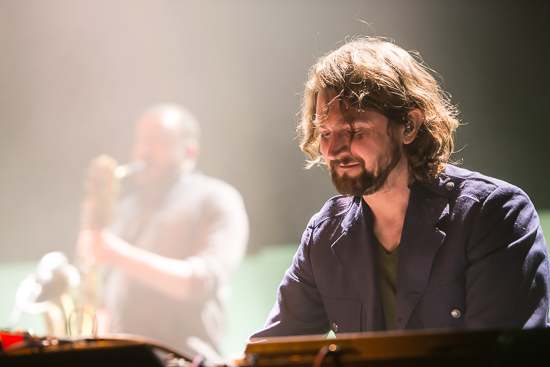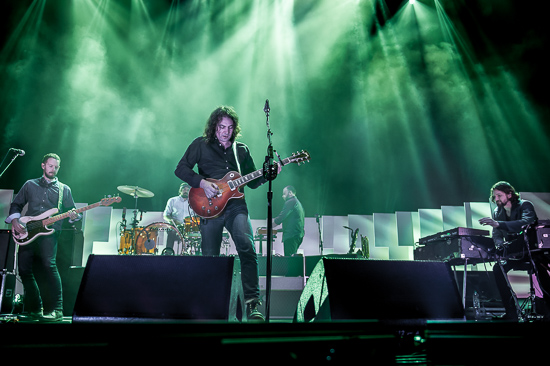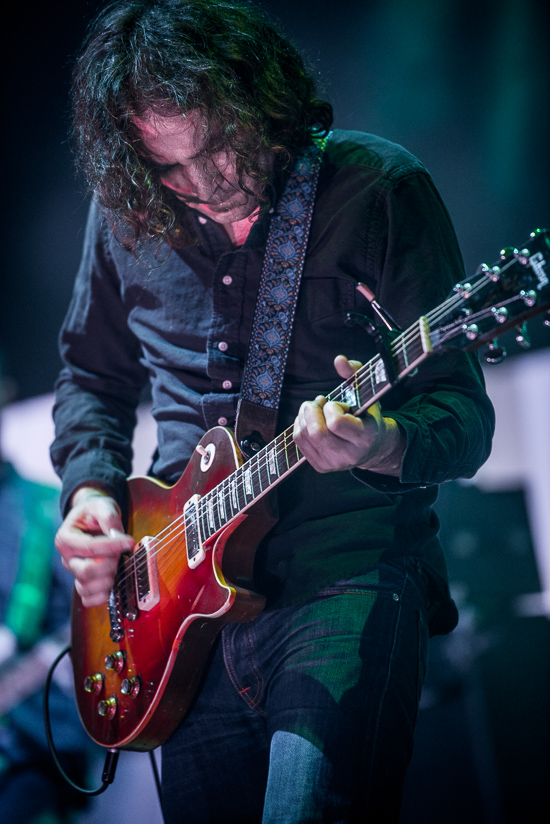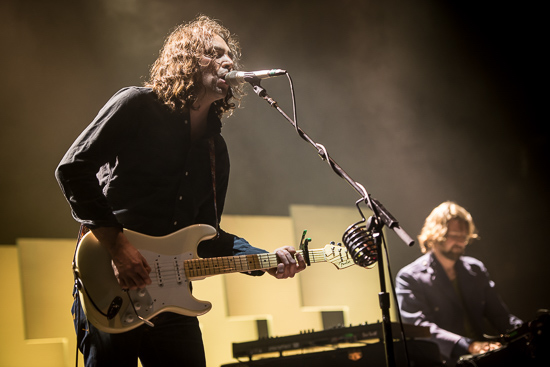"I’m just a bit run down here at the moment," sings Adam Granduciel on ‘Eyes To The Wind’. As inconsequential as the line looks, it’s almost a subtle double-bluff and one which carries the key to last year’s Lost In The Dream: "a bit run down" is a euphemistic nod to wholesale emotional and mental exhaustion, and "the moment" is its slowly-exploded fallout, one that carried through the album’s two-year-long gestation. During its making, Granduciel went through the maelstrom of an onset of severe panic attacks followed by a break-up, a full-scale upheaval that produced an album of shimmering density. That sheer tumult was rendered in seams of carefully graduated guitar, synth and tape loops, layered on top of the occasional kinetic tick of a drum machine and deeply embedded brass lines, picking up the sonic approach of previous album Slave Ambient, which didn’t so much trade in songs as it did in evoking widescreen textures that moved in and out of focus. Over these, Granduciel tacked lyrics that map out an emotional directionlessness, where moments of hope – "It never gets too dark to find/ Anybody at any time" – butt up against vulnerability: "I was sailing down here on the wind/ When I met you and I fell away again."
The culmination is something that feels mammoth. As Granduciel says: "My thought was, well, I can live in fear and make a tiny bedroom record… But this band needed to make a bigger sounding, high-fi professional record." When it does hone in on that "bigger" sound, it goes huge-scale: there’s the massive two-chord drive of opener ‘Under The Pressure’, the bursting uplifts of ‘Red Eyes’ and ‘Burning’, and closer ‘In Reverse’, which secretes a crystalline pop song in-between aqueous waves of guitar.
Taken onstage, it’s a slightly different beast: the sonic gloaming out of which so many of the songs resolve has to be shed for something more direct. At Manchester’s Albert Hall, the band bank more heavily on the rock side of the equation, the solo in ‘An Ocean In Between The Waves’ breaking free with razor sharpness, while at the final show of their UK run at Brixton Academy two weeks later, they make a little more of the album’s ambient moments, lingering over the keyboard glimmer of ‘Suffering’, played out under a matrix of spotlights.

Granduciel’s guitar-playing is something else live: on the album, by and large, it remains one of the features of the landscape; here it looms large, ceaselessly throwing up the melodic earmarks of songs or brief entanglements of colour in-between lines, sometimes meshing with Jon Natchez’s baritone saxophone. There are flashes, too, of the big names that have imprinted themselves on the band’s sound – there’s Bruce Springsteen in the organ blare on ‘Arms Like Boulders’ and the guitar that winds up at the beginning of ‘Eyes To The Wind’ recalls Mark Knopfler’s Local Hero soundtrack – but the band leave all that behind at their best moments, whether founded on a reflective, locally-appropriate cover of Bill Fay’s ‘I Hear You Calling’ in Brixton, or during the closing surge of ‘An Ocean In Between The Waves’ in Manchester, threatening to break out of the hole-strewn glass windows of the former Methodist hall.

Perhaps the best thing about the band’s live sound, though, is the way it forefronts Granduciel’s words. Not submerged beneath a haze of reverb, they’re laid bare: big statements, generous in their malleability, lines that can curve to fit around personal situations and ones that ache from the rawness of familiar emotions experienced afresh. Sometimes, admittedly, they feel a little graceless and other times outright corny, dealing in scuffed imagery – lost in dreams, covered in darkness – but then what’s the point in a break-up album if not to dwell on some of those same feelings aired time and again anyway? And it’s not as though he’s offering any solutions: the album starts "standing in the wake of our pain", and despite flare-ups of hope, by the end we’re nowhere further, veering even towards a backwards freefall, "like a light that’s drifting, in reverse I’m moving". ‘In Reverse’ isn’t what the band end the main set with in Brixton, though; that’s ‘Come To The City’, a song that courses forwards on aerated synth lines and martial drums, followed up with two more songs from Slave Ambient, ‘Your Love Is Calling My Name’ and ‘It’s Your Destiny’, in the encore that share that spirit.

It seems right to end the gigs on a high. The live show brings a completion to a record that, for all the rumination that must have gone into its construction, is left ragged. Lost In The Dream works so well because it’s a synchronic capture of emotional turmoil: you expect some change for the better over the album’s duration, a hand to shake the figure staring straight into nothing on ‘Under The Pressure’ out of his daze, but that never comes. Live, Granduciel tells a different story, one that seems to grasp onto the "derivative of pain" on ‘Burning’, that capacity for something good that lies in the hurt of something lost, and runs with it.
All photographs courtesy of Valerio Berdini


